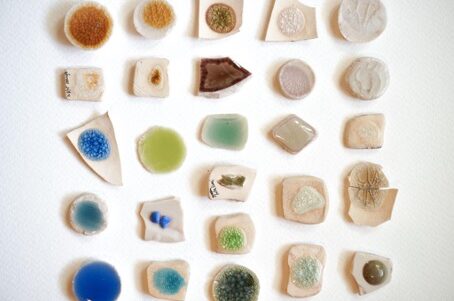Undine Foulds, dirt water fire salt (2023)

Instructions for Sourcing Local Materials
Discover a new puddle after rain. Poke into the mud with a stick. Ditch the stick, reach in, roll it into a ball, yes, now both hands are dirty. Convince the others to join; develop a complex mud-pie baking system on sun-silvered wood scraps from the wild corner of the yard. The earth, caked up to your elbows, takes the water from your skin. It lightens, cracks, and pulls at you as it dries. Grow out your kid teeth.
Sit in the sand, let your wet skin collect it.
Pull up handfuls and handfuls and handfuls and let the gritty dust of it fall through your fingers in a soft, grainy rain.
Tunnel your hands and heels below the hot top layers to the cool water underneath.
Learn about floating (you) and sinking (also you). Ask, “What is a vessel?” Find some: row, cargo, navy, sail, tug, cruise, ferry, tall, speed. Race the kind made of sticks in fast rivers, throwing them from bridges.
Dunk your head under the water. Hold your breath.
Small rocks, pushed by the waves, roll to make a babble sounding through the water flooding your ears. The bubbles in the rockweed fizz and your strained heart beats louder, waiting for air. Wiggle your toes under the mushy leaves on the bottom (they are covering something slick). Grab the slippery goo, squeeze it in your fist. It keeps the shape of every finger crease! It moves nothing like sand.
Get to know time: your entire life into muscle memory, or about how long it takes to mold into and remember form. How far backwards and forwards can you see from your small rise? Get to know the repetitive nature by which you can count and measure it. You revisit, among others, the time it takes to work through a bad idea and the time it takes to make one hundred cups. How many decades to wear away stone, anyway, and how many for that dust to float the river and settle at the bottom of the sea? How many revolutions for the sea to become prairie? And how long to mine it, box it, and drive it to my doorstep? (Make another hundred cups out of the earth’s belly.)
Watch the world creak and groan and pull apart. Watch the words shift from prediction to report to describe the arrival of the unprecedented. Watch the snowline leave earlier and arrive later, watch the big trees fall or burn or beetle. Watch the mine grow, the city expand, and the road widen. The quarries are filling with the clearest bluegreen pools, the morels sprouting generously after the burn. When the power goes out, gather candles, eat the freezer wait. When the skies ash over, stay inside. When the sea eats the shore line, stay high.
Maintain some kind of a body home as it grows and bends and dries out. Contend with its working memory (muscle, scar, histamine, thought) like you’ve learned might work: push, compress, stretch, score, reinforce, add, imprint, pull, repeat, release. Anticipate the stress of expansion and contraction under incredible heat. Brush your teeth, brush your hair, pack snacks to forget and find later.
Ask, “what will happen if you put this in the fire?”
Notice which crumbs make glass, and which stay tall. Within your reach: touch, dig, rub, sift, crush, grind, slake, mix, collect, compare, guess. Continue.
Reconcile knowing that the things you are making will remain in their form long after you lose yours. Be comforted with the knowledge that all your teeth will too make their way to settle at the bottom of a sea.
With two hands stacked under your shoulders, roll it away and towards you in a slow, spiraling turn. Learn what it feels like to measure, stress, and bend between your fingers. It will soften some as it moves. Within the scale of your arms and feet, catalog a burning world.



